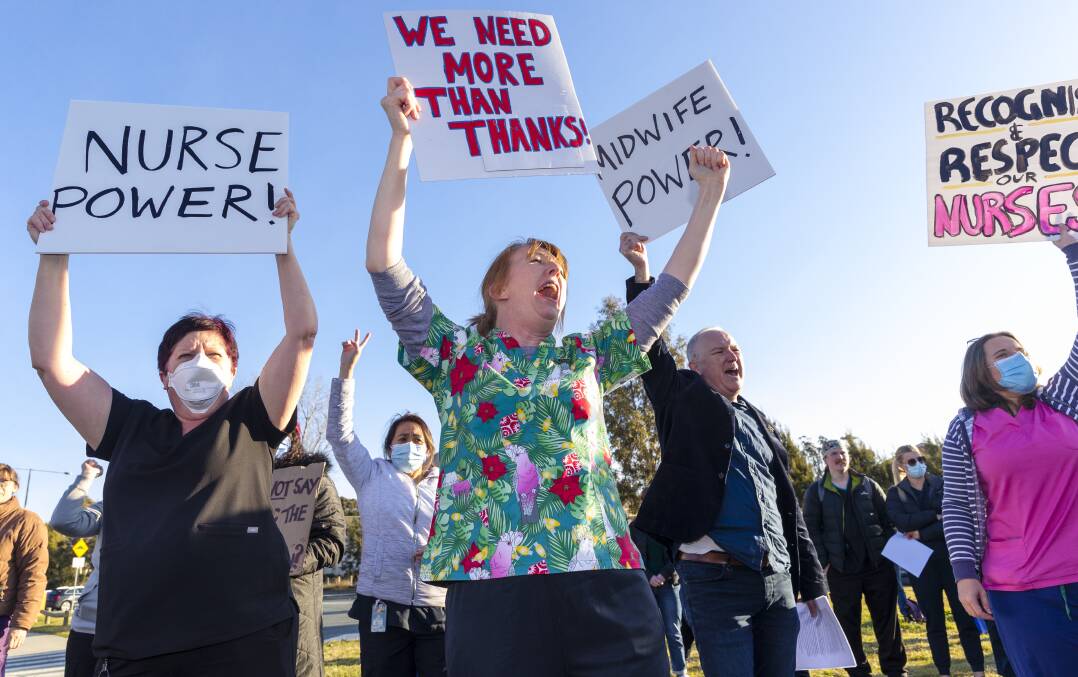Nurses and midwives are facing high levels of psychological distress, a toxic workplace culture, poor rostering practices and chronic staffing issues within the ACT's health system, their union claims.
The territory government has been urged to implement a comprehensive workforce plan for nurses and midwives to avoid the "further demoralisation" of staff and "poorer health outcomes for the ACT community".
Nursing and midwifery staff have also aired their views about the state of the system, with one saying nurses were "treated like a piece of furniture".
A parliamentary inquiry is underway into a recovery plan for nurses and midwives in the ACT health system.

The inquiry was prompted by a petition with more than 2600 signatures. It calls for the government to develop a recovery plan for nurses.
The petition was started by the Australian Nursing and Midwifery Federation ACT. The federation has submitted a lengthy submission to the inquiry.
The submission said some of the main issues faced include workforce shortfalls, a lack of comprehensive planning, limited flexible working arrangements and the potential for dangerous patient outcomes.
The union has recommended the government develop a specific recovery plan for nurses and midwives and the implementation of positive practice environment standards.
"Acting now is critical to avoid further demoralisation of the ACT nursing and midwifery workforce, the deterioration in the safety and quality of hospital and health services, and poorer health outcomes for the ACT community," the submission said.
Union members were also asked to submit comments ahead of the submission to the inquiry. The union included 78 comments from nurses and midwives in the submission.
"The staff who are still currently braving our workplaces each day are tired, emotionally exhausted and running on empty. They are surviving, and that's not good enough and it's not OK," one comment said.
Another said: "Delivering suboptimal care in a very broken system is very difficult.
"We've carried our community through COVID and the lack of appreciation from the Barr government is incredibly disheartening."
Many comments also referenced culture within the hospital, with one saying: "bullying and harassment still happens on a grand scale and nothing is done about it. Bullies get promoted."
Another comment said, "Our internal culture of bullying, blame and the stigma associated with saying 'I am not OK' is so ingrained that I predict it would take a 10-year continuous effort to make it match current industry standards and fulfil current legal safe workplace obligations."
The comments about culture come after it was revealed this week health authorities had promoted culture improvements based on a survey with a response rate they had initially said would not be statistically valid.

Australian Nursing and Midwifery Federation ACT branch secretary Matthew Daniel said he was "completely gobsmacked" to discover Canberra Health Services and the territory government had promoted the survey based on a low response rate.
But he said he had harboured concerns about the survey because the results did not match what he had heard from union members.
"For some time I have been concerned about what CHS and the government have been saying about improved culture and it didn't gel with our own intelligence from our membership in terms of what they were telling us," Mr Daniel said.
"I had senior leaders that are part of our membership telling us it's worse and it was the worst it's ever been, so nothing quite gelled for me and I didn't know why but now I know why."
There was a survey of nearly 3000 staff from Canberra Health Services in December last year to measure workplace culture within the organisation. The results showed 58 per cent of respondents felt the organisation was a "truly great place to work".
But only 35 per cent of staff responded to the survey. Officials were told by the firm that conducted the survey that results were not definitive unless more than 40 per cent of the organisation responded.
In an internal memo sent to staff before the survey closed, the communications team from Canberra Health Services told staff the result needed to be above 40 per cent to be "statistically valid".
However, Canberra Health Services has said a "response validation test" was conducted and it had shown a greater response rate would not have had a significant effect on the results.
"For this reason we can have confidence in the pulse survey results," a spokesman said.
The ACT government has also made a submission to the inquiry. Its submission said the e-petition and inquiry had highlighted matters that were already a priority for the government.
"The government has been focused on addressing workload through effective workforce planning, ensuring a healthy and safe workplace, and promoting a positive culture in ACT public health services that prioritises workforce wellbeing," the submission said.
The government also said it was developing a health workforce to provide an overarching approach to workforce planning in the ACT, including nursing and midwifery.
But the government's submission also highlighted recruitment challenges.
"An international shortage of nurses and midwives, alongside other health professionals, is having a profound impact on health systems globally," the submission said.
"This is a complex workforce issue further exacerbated by the impacts of the COVID-19 pandemic on all health workers."
The submission mentioned that the government had invested in a national nursing and midwifery recruitment campaign which started in September.
We've made it a whole lot easier for you to have your say. Our new comment platform requires only one log-in to access articles and to join the discussion on The Canberra Times website. Find out how to register so you can enjoy civil, friendly and engaging discussions. See our moderation policy here.







